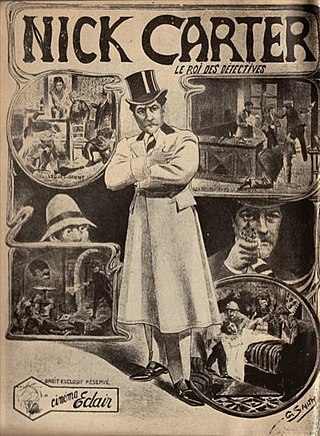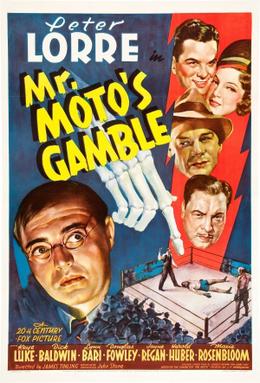
Mr. Moto is a fictional Japanese secret agent created by the American author John P. Marquand. He appeared in six novels by Marquand published between 1935 and 1957. Marquand initially created the character for the Saturday Evening Post, which was seeking stories with an Asian hero after the death of Charlie Chan's creator Earl Derr Biggers.

Charlie Chan is a fictional Honolulu police detective created by author Earl Derr Biggers for a series of mystery novels. Biggers loosely based Chan on Hawaiian detective Chang Apana. The benevolent and heroic Chan was conceived as an alternative to Yellow Peril stereotypes and villains like Fu Manchu. Many stories feature Chan traveling the world beyond Hawaii as he investigates mysteries and solves crimes.

A mystery film is a genre of film that revolves around the solution of a problem or a crime. It focuses on the efforts of the detective, private investigator or amateur sleuth to solve the mysterious circumstances of an issue by means of clues, investigation, and clever deduction. By 2022, mystery films are generally referred to as detective fiction.

Murder at the Gallop (1963) is the second of four Miss Marple films made by Metro-Goldwyn-Mayer. It was based on the 1953 novel After the Funeral by Agatha Christie, and starred Margaret Rutherford as Miss Jane Marple, Charles "Bud" Tingwell as Inspector Craddock and Stringer Davis as Jane Marple's friend Mr Stringer.
Philip MacDonald was a British-born writer of fiction and screenplays, best known for thrillers.

Mr. Moto's Gamble is the third film in the Mr. Moto series starring Peter Lorre as the title character. It is best remembered for originating as a movie in the Charlie Chan series and being changed to a Mr. Moto entry at the last minute.
Michael "Mike" Shayne is a fictional private detective character created during the late 1930s by writer Brett Halliday, a pseudonym of Davis Dresser. The character appeared in a series of seven films starring Lloyd Nolan for Twentieth Century Fox, five films from the low-budget Producers Releasing Corporation with Hugh Beaumont, a radio series under a variety of titles between 1944 and 1953, and later in 1960–1961 in a 32-episode NBC television series starring Richard Denning in the title role.

Think Fast, Mr. Moto is a 1937 film directed by Norman Foster and featuring a mysterious Japanese detective named Mr. Moto. It is the first of eight films in the Mr. Moto series, all based on the character Mr. Moto created by John P. Marquand. The film stars Peter Lorre as the title character, Virginia Field, Thomas Beck and Sig Ruman. Mr. Moto works to stop a secret smuggling operation.

Mysterious Mr. Moto, produced in 1938 by Twentieth Century Fox, is the fifth in a series of eight films starring Peter Lorre as Mr. Moto.

Time to Kill is an American mystery film directed by Herbert I. Leeds. It is the first screen adaptation of Raymond Chandler's novel The High Window, which was remade five years later as The Brasher Doubloon. The detective was changed from Philip Marlowe to Michael Shayne for this version, with Lloyd Nolan playing the part and Heather Angel in a rare turn as leading lady. It is also the final Michael Shayne film starring Lloyd Nolan made at Fox, who closed down their popular B movie unit which included Mr. Moto, Charlie Chan, and the Cisco Kid. In 1946 the series would be reborn at Producers Releasing Corporation with Hugh Beaumont taking over the role.
Nigel Strangeways is a fictional British private detective created by Cecil Day-Lewis, writing under the pen name of Nicholas Blake. He was one of the prominent detectives of the Golden Age of Detective Fiction, appearing in sixteen novels between 1935 and 1966. He also features in a couple of short stories.

Murder in Trinidad is a 1934 American pre-Code mystery film directed by Louis King and starring Nigel Bruce, Heather Angel, Victor Jory, and Murray Kinnell. It was produced and distributed by Fox Film. It is based on the 1933 novel Murder in Trinidad by John Vandercook, which provided the loose inspiration for the later films Mr. Moto in Danger Island (1939) and The Caribbean Mystery (1945).

Stopover Tokyo is a 1957 American film noir crime film directed by Richard L. Breen and starring Robert Wagner, Joan Collins, Edmond O'Brien and Ken Scott. Filmed in Japan in CinemaScope, the film is set in Tokyo and follows a US counterintelligence agent working to foil a communist assassination plot.

One Jump Ahead is a 1955 British crime film directed by Charles Saunders and starring Paul Carpenter, Diane Hart, Jill Adams and Freddie Mills. The film was based on a novel by American crime novelist Robert H. Chapman. The screenplay concerns a journalist who helps police track down the killer of a female blackmailer. The title refers to the reporter's attempts to keep "one jump ahead" of the police in solving the crime.

The Caribbean Mystery is a 1945 American film noir mystery film which marked the directorial debut of Robert D. Webb. It is the third film adaptation of the 1933 novel Murder in Trinidad by John W. Vandercook to be produced by 20th Century Fox. Starring James Dunn, Sheila Ryan, and Edward Ryan. the plot finds a Brooklyn detective summoned to a Caribbean island to solve the disappearance of eight geologists who had visited an alligator-infested swamp. The lead role was rewritten especially for Dunn after his successful film comeback in A Tree Grows in Brooklyn (1945), also produced by 20th Century Fox.

Mr. Moto in Danger Island is a 1939 American mystery film directed by Herbert I. Leeds and starring Peter Lorre, Jean Hersholt and Amanda Duff. It is part of the Mr. Moto series of films.
A Maid of the Silver Sea is a 1922 British silent drama film directed by Guy Newall and starring Newall, Ivy Duke and Cameron Carr. It is an adaptation of the 1910 novel of the same name by John Oxenham.

The Beast Must Die is a 1938 detective novel by Cecil Day-Lewis, written under the pen name of Nicholas Blake. It combines elements of the inverted thriller with a classic Golden Age-style investigation. It is the fourth in a series of novels featuring the private detective Nigel Strangeways. The title is inspired by a line in Four Serious Songs by Johannes Brahms, itself a reference to Ecclesiastes.
John Womack Vandercook was a British-born American writer of mystery and travel books as well as a radio commentator.














